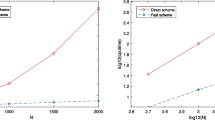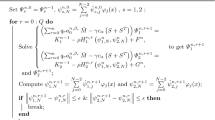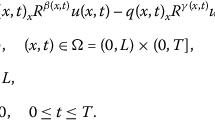Abstract
In this paper, a numerical method is proposed to solve the time-space fractional diffusion equation with Robin fractional derivative boundary condition. Under the weak regularity assumptions of solution, we present a numerical scheme based on the L1 method for time discretization on graded mesh and the Grünwald-Letnikov formula for spatial discretization on uniform mesh. And a fast scheme for the considered problem is constructed based on the exponential summation approximation of the kernel function t−α. Meanwhile, a detailed analysis of stability and convergence is given. Then, the extrapolation method is applied to the space direction to make it reach the second-order accuracy. Finally, numerical experiments show that the proposed method is effective.




Similar content being viewed by others
References
Giona, M., Roman, H. E.: Fractional diffusion equation for transport phenomenna in random media. Physica A. 185, 87–97 (1992)
Gorenflflo, R., Mainardi, F., Moretti, D., Pagnini, G., Paradisi, P.: Discrete random walk models for space-time fractional diffusion. Chem. Phys. 284, 521–541 (2002)
Podlubny, I.: Fractional Differential Equations. Academic Press, San Diego (1999)
Baeumer, B., Kovács, M., Meerschaert, M., Sankaranarayanan, H.: Reprint of: Boundary conditions for fractional diffusion. J. Comput. Appl. Math. 339, 414–430 (2018)
Kelly, J.F., Sankaranarayanan, H., Meerschaert, M.: Boundary conditions for two-sided fractional diffusion. J. Comput. Phys. 376, 1089–1107 (2019)
Boutiara, A., Benbachir, M., Guerbati, K.: Caputo type fractional differential equation with nonlocal Erdelyi-Kober type integral boundary conditions in Banach spaces. Sur. Math. Appl. 15, 399–418 (2020)
Zhang, Y., Christopher, T., Labolle, E., Neupauer, R., Sun, H.: Bounded fractional diffusion in geological media: Definition and Lagrangian approximation. Water Resour. Res. 52, 8561–8577 (2016)
Guo, B., Xu, Q., Yin, Z.: Implicit finite difference method for fractional percolation equation with Dirichlet and fractional boundary conditions. Appl. Math. Mech. 37, 403–416 (2016)
Jia, J., Wang, H.: Fast finite difference methods for space-fractional diffusion equations with fractional derivative boundary conditions. J. Comput. Phys. 293, 359–369 (2015)
Liu, T., Hou, M.: Finite difference approximation for one-dimensional Riesz fractional diffusion equation with fractional boundary condition, vol. 55 (2018)
**e, C., Fang, S.: A second-order finite difference method for fractional diffusion equation with Dirichlet and fractional boundary conditions. Numer. Methods Partial Differ. Equ. 35(4), 1383–1395 (2019)
**e, C., Fang, S.: Finite difference scheme for time-space fractional diffusion equation with fractional boundary conditions. Math. Methods Appl. Sci. 43, 3473–3487 (2020)
Sun, Z., Wu, X.: A fully discrete difference scheme for a diffusion-wave system. Appl. Numer. Math. 56, 193–209 (2006)
Lin, Y., Xu, C.: Finite difference/spectral approximations for the time-fractional diffusion equation. J. Comput. Phys. 225, 1533–1552 (2007)
Gao, G, Sun, Z., Zhang, H.: A new fractional numerical differentiation formula to approximate the Caputo fractional derivative and its applications. J. Comput. Phys. 259, 33–50 (2014)
Alikhanov, A.: A new difference scheme for the time fractional diffusion equation. J. Comput. Phys. 280, 424–438 (2015)
Stynes, M., \(O^{\prime }\)Riordan, E., Gracia, J.: Error analysis of a finite difference method on graded meshes for a time-fractional diffusion equation. SIAM J. Numer. Anal. 55(2), 1057–1079 (2017)
Huang, C., Liu, X., Meng, X., Stynes, M.: Error analysis of a finite difference method on graded meshes for a multiterm time-fractional initial-boundary value problem. Comput. Meth. Appl. Math. 20(4), 815–825 (2020)
Shen, J., Sun, Z., Du, R.: Fast finite difference schemes for time-fractional diffusion equations with a weak singularity at initial time. East Asian J. Appl. Math. 8(4), 834–858 (2018)
Zhang, Y., Sun, Z., Liao, H.: Finite difference methods for the time fractional diffusion equation on non-uniform meshes. J. Comput. Phys. 265, 195–210 (2014)
Liao, H., Li, D., Zhang, J., Zhao, Y.: Sharp error estimate of nonuniform L1 formula for time-fractional reaction-subdiffusion equations. SIAM J. Numer. Anal. 56(2), 1112–1133 (2018)
Li, C., Yi, Q., Chen, A.: Finite difference methods with non-uniform meshes for nonlinear fractional differential equations. Comput. Appl. Math. 316, 614–631 (2016)
Jiang, S., Zhang, J., Zhang, Q., Zhang, Z.: Fast evaluation of the Caputo fractional derivative and its applications to fractional diffusion equations. Commun. Comput. Phys. 21(3), 650–678 (2017)
Samko, S., Kilbas, A., Marichev, O.: Fractional Integrals and Derivatives: Theory and Applications. Gordon Breach, Yverdon (1993)
Funding
This research is supported by the National Natural Science Foundation of China (Nos. 12071403, 11601460), and the Project of Scientific Research Fund of Hunan Provincial Science and Technology Department of China (No. 2018WK4006).
Author information
Authors and Affiliations
Corresponding author
Additional information
Publisher’s note
Springer Nature remains neutral with regard to jurisdictional claims in published maps and institutional affiliations.
Appendix A: The proof of the inequality (46)
Appendix A: The proof of the inequality (46)
Proof
It is proved by induction. When n = 1, it follows from (45) that
So, the inequality (46) holds for n = 1. Suppose that it holds for j ≤ n − 1. Next, we prove it is also holds for j = n. By (45), we have
Thus, it is available that
This completes the proof. □
Rights and permissions
About this article
Cite this article
Zhang, B., Bu, W. & **ao, A. Efficient difference method for time-space fractional diffusion equation with Robin fractional derivative boundary condition. Numer Algor 88, 1965–1988 (2021). https://doi.org/10.1007/s11075-021-01102-z
Received:
Accepted:
Published:
Issue Date:
DOI: https://doi.org/10.1007/s11075-021-01102-z




